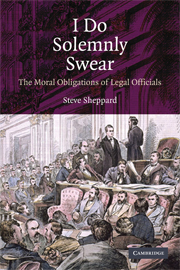Book contents
- Frontmatter
- Contents
- Preface: Moral Officials, Retail Justice, and Three Caveats
- Acknowledgments
- Introduction: Seven Questions about What Is Fit for an Official to Do
- 1 Law and Office
- 2 The Stakes: The Interests of Others in Official Actions
- 3 Officials' Obligations Arise from More Than the Law Alone
- 4 The Moral Obligations of Legal Officials
- 5 Patterns of Relationship between Legal and Moral Obligations
- 6 Breaching Obligations
- 7 Tools for the Trade: Maxims and Fallacies
- Epilogue: What the Official Ought to Do: Law and Justice
- Appendix: Taxonomy of Headings: The Lawes and Libertyes of Massachusetts (Discussed in Chapter 1)
- Index
- References
7 - Tools for the Trade: Maxims and Fallacies
Published online by Cambridge University Press: 05 June 2012
- Frontmatter
- Contents
- Preface: Moral Officials, Retail Justice, and Three Caveats
- Acknowledgments
- Introduction: Seven Questions about What Is Fit for an Official to Do
- 1 Law and Office
- 2 The Stakes: The Interests of Others in Official Actions
- 3 Officials' Obligations Arise from More Than the Law Alone
- 4 The Moral Obligations of Legal Officials
- 5 Patterns of Relationship between Legal and Moral Obligations
- 6 Breaching Obligations
- 7 Tools for the Trade: Maxims and Fallacies
- Epilogue: What the Official Ought to Do: Law and Justice
- Appendix: Taxonomy of Headings: The Lawes and Libertyes of Massachusetts (Discussed in Chapter 1)
- Index
- References
Summary
Indeed it is not an easy matter to be really concerned with other people's affairs.…Nevertheless, when things turn out for our own good or ill, we realize it more fully and feel it more deeply than when the same things happen to others and we see them only, as it were, in the far distance; and for this reason we judge their case differently from our own. It is, therefore, an excellent rule that they give who bid us not to do a thing, when there is a doubt whether it be right or wrong; for righteousness shines with a brilliance of its own, but doubt is a sign that we are thinking of a possible wrong.
Cicero, On Duties, Book I, Chapter IXHow should officials use their instincts for right and wrong, their understandings of their moral obligations? Throughout this book, in which we have asked who are officials, what are the stakes of others in their acts, what obligations are required other than law, what moral obligations relate to legal office, how do obligations affect one another, and what is the meaning of breach, the problem of how do it has lurked just beneath the surface. There is, to be sure, a gap between describing duties and applying them. The law must be seen by the people to be fair, and the officials must work to achieve fairness for those who hold the stakes, if they are to retain the trust of the people subject to the law or to achieve the official aims of the law itself.
- Type
- Chapter
- Information
- I Do Solemnly SwearThe Moral Obligations of Legal Officials, pp. 226 - 263Publisher: Cambridge University PressPrint publication year: 2009



